Ronda M. Walker: Ethics in leadership

“Neither the wisest constitution nor the wisest laws will secure the liberty and happiness of a people whose manners are universally corrupt.” -Samuel Adams If it isn’t illegal, then it isn’t unethical. That is the mentality many elected officials have adopted in our state and nation. Politicians wheel and deal in the gray area between right and wrong, craftily balancing on the line of legitimacy, careful not to slip a foot into the land of illegality. They carelessly push the limits of right and wrong with virtually no regard for what is actually right and wrong. When it becomes our goal as public officials to simply avoid activity classified as a criminal offense against public law, and we ignore our moral obligation to hold ourselves to a different, more stringent standard, we erode the public trust and become a significant threat to the stability of our democracy. Unfortunately, recent comments by our Governor demonstrate this skewed mindset that many have used as justification for their actions. I literally sat with my mouth agape as I read a quote from Alabama Governor Robert Bentley’s recent press conference. We have all heard the audio recordings of intimate conversations between the Governor and another woman who is not his wife. We have heard the allusions from the Governor himself to a physical relationship between he and a woman that is not his wife. Yet, he stood at a microphone recently at a crowded press conference and actually said the words, “I’ve done nothing – absolutely nothing – that is illegal or unethical.” Every fiber of my moral being was offended at the words he spoke. While the illegal portion of his statement is still being investigated, unless the audio recordings are one day proven false, the unethical portion of his actions has been splayed across the Internet and national news enough for everyone to know he has most certainly acted unethically, immorally, and without regard for the sanctity of the office he holds. The fact that he can say with a straight face that he has not acted unethically reveals the semantic game public officials often play to justify their questionable actions. When leaders decide to parse the meaning of criminal and ethical behavior when deciding on a particular action we lose our virtue, our freedom, and our greatness. Character matters, a great society cannot remain so without a common sense of decency, especially amongst leadership. We need leadership that holds truth inviolable. We need leaders that value honesty, integrity, loyalty, and respect for others above all else. That is ethical behavior. Ethical behavior is not about obeying man’s law, ethical behavior is about being a better person. About having a moral standard that governs everything you do. Doing the right thing even when no one is watching, doing the right thing even when you think no one is listening. If I know my neighbor is elderly, ailing, and struggling to care for his wife who has progressing Alzheimer’s and I do nothing to help meet their basic needs I have not violated state or federal law. If I fail to show my children physical love and affection I have not violated state or federal law. If I lie to my husband and engage in an extramarital affair I have not violated state or federal law. But in each case I have most certainly violated the basic moral and ethical standards of conduct that distinguish right and wrong in human action. I have revealed my character as self-serving and weak. And I have failed in my moral obligation as a neighbor, mother, and wife. Unfortunately, many elected officials do a quick-footed dance through questionable areas of personal activity with their biggest concern being the avoidance of prosecution. When public officials become more concerned about violating the law than violating the public trust they no longer serve the public, but themselves. We are too great a people to accept such disingenuous leadership. But unfortunately we have accepted it for generations. There are numerous examples of both local and national leaders, from all political parties, who have acted in ways unbecoming and who, instead of being chastised by the electorate have been given a pass. Seriously, some have even gone to jail for criminal offenses and enjoyed a baffling political comeback so perhaps I should not be so surprised that we turn a blind eye to infidelity. I was sworn in to the Montgomery County Commission in February 2014. Immediately after being sworn in I was told I must participate in a mandatory training program coordinated by the Association of County Commissions of Alabama (ACCA) intended to educate new Commissioners on their role and responsibility. The first class I took was entitled “Ethics for Public Officials.” This class was facilitated by staff from the ACCA, the Alabama Ethics Commission, and a local attorney. One of the topics of discussion was the differentiation between an act being unethical and an act being in violation of the law. Unfortunately, this is a distinction elected officials insist upon using as their standard for decision-making. Is what I am about to do illegal, or simply unsavory? A portion of the Ethics training was led by Sonny Brasfield, Executive Director of the Association of County Commissions of Alabama. As someone who has worked in and around Alabama politics for years, and has conducted numerous ethics training courses, I consider Mr. Brasfield an expert in this area. And because he summed up the truth so clearly and succinctly, I am going to quote Mr. Brasfield’s introduction to the discussion on ethics: “The Alabama Ethics Law is a criminal statute, which outlines behaviors that are legally permissible as well as those behaviors that are illegal. The illegal behaviors, if prosecuted, will result in fines, imprisonment or both. Following the Alabama Ethics Law does not mean that a public official or employee is acting in an ethical manner. In fact, there is no question that an individual can participate in unethical
Robert Bentley says, ”I have no intentions of resigning”

Embattled Gov. Robert Bentley visited rural Franklin County in northern Alabama on Wednesday, his first trip to the area since his administration was rocked last by a scandal involving inappropriate comments to a former employee. Bentley spoke to groups in the town of Russellville, where he addressed issues related to rural access to health care and broadband internet. But of course, when he spoke with reporters, the questions quickly went to his alleged misconduct with former political advisor Rebekah Caldwell Mason. Asked whether he would resign, Bentley was definitive: “I have no intentions of resigning. My intentions are to try to make this state better, to work through the difficulties we’re going through.” “Have I made mistakes? Yes. I’m sorry. We have addressed them. I’ve apologized. These are old issues, but it’s just now that people are hearing about them,” Bentley said. “We may have some organizational changes, but we’re going to work through this and I want the people of the state to know how much I care about them. I want the people of Franklin County to know how much I care about them. They’ve known that over the years when I was here for the tornadoes. They know that I love them.” Bentley now faces an investigation by the state’s ethics commission on allegations he violated the terms of his office during the Mason affair. State Auditor Jim Zeigler, a staunch critic of his fellow Republican Bentley, filed the complaint that precipitated the probe.
Robert Bentley to be investigated by state ethics commission
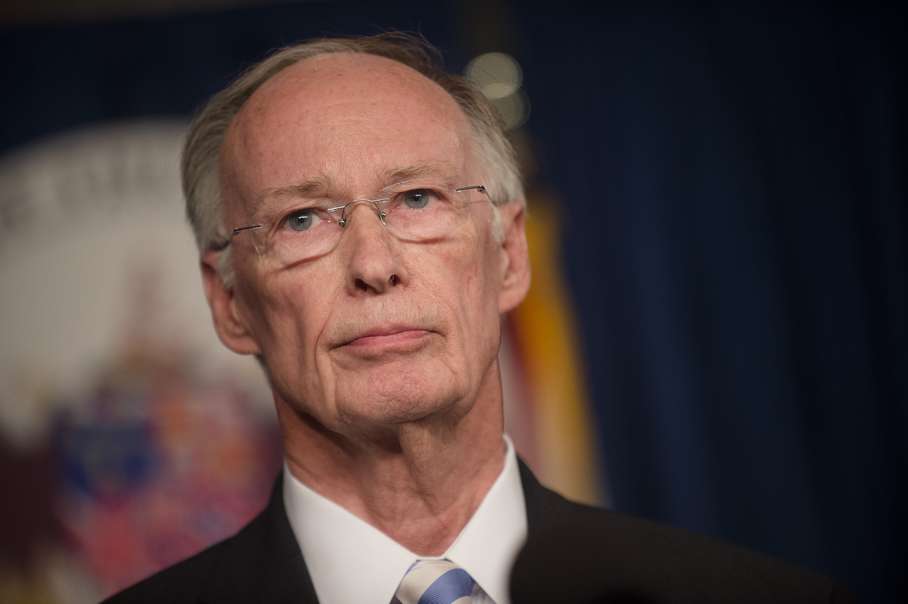
On Tuesday, the Alabama Ethics Commission responded to a complaint filed by State Auditor Jim Zeigler in reference to an alleged affair between Gov. Robert Bentley and staff member Rebekah Mason. Ethics Commission attorney Hugh Evans informed Zeigler that case numbers have been assigned to the complaint and special agents will be assigned to investigate soon. Evans also instructed Zeigler not to discuss the ongoing investigation “in order to maintain the integrity of the investigation.” However, Zeigler has still been encouraged to pass on any additional evidence he may come across. The complaint was lodged after sexually explicit audio recordings of Bentley surfaced, though he and Mason both have contended that there was no physical affair between them. Zeigler contends that Bentley may have misused his office if in fact it was used for an affair – in one of the recordings, Bentley mentions having to rearrange his office. While it is unclear when the ethics commission will complete its investigation, if Bentley is found to have misused his office for salacious encounters he may well be eligible for impeachment on the grounds that such a misuse would constitute an “offense involving moral turpitude while in office.”
Robert Bentley responds to Jim Zeigler’s ethics complaint

Shortly after news broke that State Auditor Jim Zeigler had filed a complaint with the Alabama Ethics Commission, urging the body to investigate the purported affair between Gov. Robert Bentley and staff member Rebekah Mason, the governor responded. In a statement released Friday afternoon, the governor said the following: “I have always complied with the ethics laws of the State. In fact, I voluntarily release my tax returns to the public every year in a spirit of openness and transparency. I have always and will continue to cooperate with the Alabama Ethics Commission.” In the statement, Bentley made no mention of the alleged affair, which he denied vehemently during a press conference Wednesday.
Sen. Phil Williams takes on blogger Bill Britt
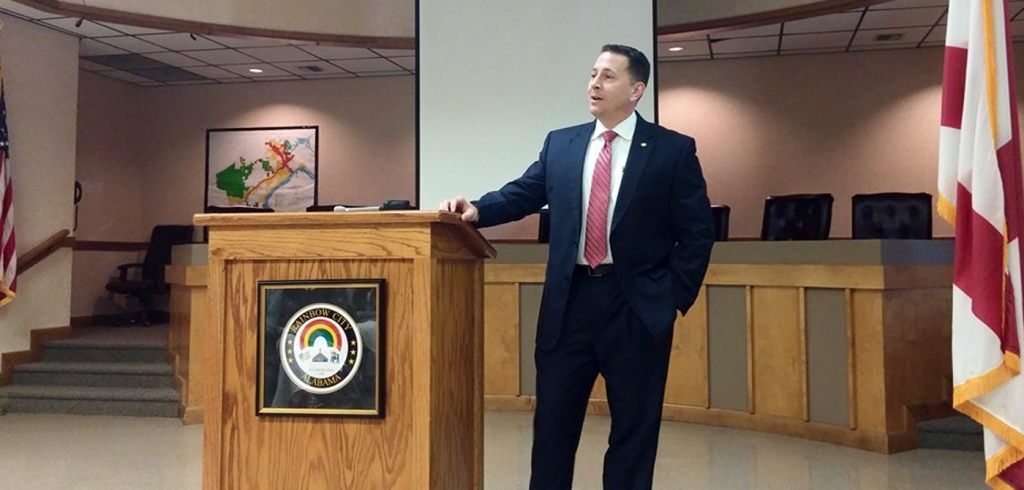
Republican state Sen. Phil Williams of Rainbow City responded today to what his office is calling “baseless attacks on his character and law practice” by the Alabama Political Reporter, a state political blog run by Bill Britt. A Jan. 7 article by the Alabama Political Reporter contended that “high-ranking government officials” had confirmed that Williams was under investigation for “possible ethics violations and other related activities.” A news release from Williams’ office noted that the senator had ignored previous defamatory blog posts, even a Dec. 22, 2015, piece in which Britt attacked his father, but took a stand this week when the blogger accused him of being under “criminal investigation.” “Over the past few weeks, a blogger named Bill Britt has written a number of posts attacking not only my character, but also the name of my late father, a highly-decorated Army veteran and revered public servant,” Williams wrote in the news release. “Further, Britt has attacked my law firm and its clients and insinuated I have used my position as a senator for private gain.” According to Williams’ news release, a full inquiry of government and law enforcement turned up no evidence of said investigation. However, to quell such attacks, Williams took the unusual step of contacting the Alabama Ethics Commission on Friday and requested that the agency conduct a full review of his law practice. “At my own insistence they have now received all five years of my client lists and will review them under seal,” Williams stated in the release. Williams is confident that the commission’s review will prove that he has “zero clients with state interests and that his annual statements of economic interest to the Ethics Commission have fully complied with the law.” “I am taking these actions not just for myself, but also for every member of the public domain who has been assaulted by bloggers and rumor-peddlers who believe they can hide behind the false pretense that they are ‘reporting the news,’” Williams added. Britt had little to say on Williams’ decision to go on the offensive this week. “The article(s) speak for themselves,” Britt responded in an email. Here’s the audio statement from Williams:
Luther Strange: Ethics opinion clear that legislators can’t lobby
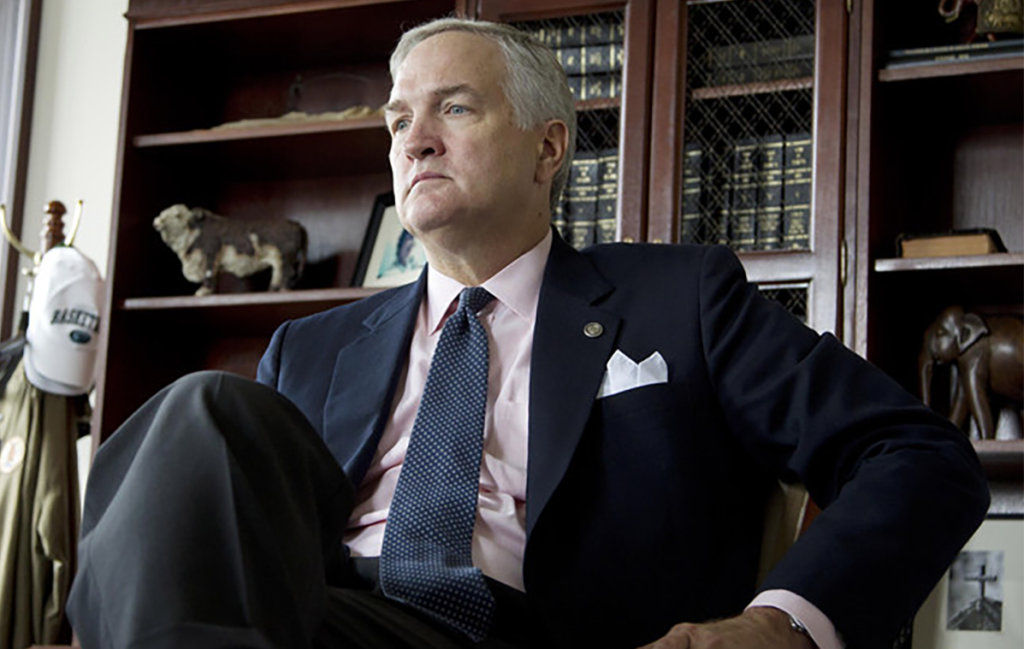
The attorney general says a new Alabama Ethics Commission opinion is clear that legislators cannot serve as hired lobbyists. Attorney General Luther Strange and the president of the Alabama District Attorneys Association sent a letter Thursday to legislators discussing the opinion. They say the opinion is “emphatic” that legislators cannot be paid to promote legislation. While lawmakers can accept salaries from organizations, they said it must be clear that the pay is unrelated to the legislator’s public position. Commissioners in October tightened advice regarding a legislator’s employment with an issue advocacy organization after prosecutors complained it undermined the ethics law. Defense lawyers for House Speaker Mike Hubbard pointed to the opinion in defending Hubbard who is accused of using his public position to obtain and assist clients. Republished with permission of the Associated Press.
Former deputy AG testifies for Mike Hubbard defense
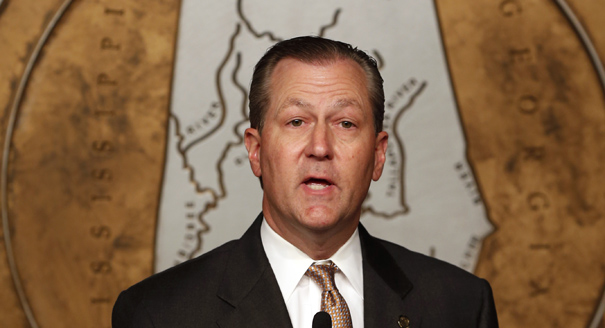
A former deputy attorney general testified Monday that a prosecutor bragged he would ruin indicted House Speaker Mike Hubbard politically. Former Deputy Attorney General Sonny Reagan‘s testimony in Lee County Circuit Court was the start of a multi-day pretrial hearing as Hubbard looks to have the corruption case against him dropped. Hubbard faces 23 felony ethics charges accusing him of using his public positions to benefit his businesses. Hubbard has denied any wrongdoing. The Auburn Republican has alleged prejudicial prosecution and has said a 2010 ethics law that he supported is unconstitutional and being incorrectly applied in this case. Reagan spent nearly four hours testifying about the ways in which he found both prosecutor Matt Hart‘s remarks and his handling of grand jury proceedings prejudicial. During the defense’s questioning, Reagan told a judge that Hart was out to ruin Hubbard and made several threats against him during private discussions. “He said he would put a gun in his mouth with his hand on the trigger, show him the indictment and maybe he would plead guilty and resign,” Reagan said. Solicitor General Andrew Brasher suggested that Hart using gruff or suggestive language about the case with Reagan in private wasn’t necessarily an indication of bias since the two both have military backgrounds. Reagan resigned in December after he was accused of trying to undermine the investigation. Attorney General Luther Strange said Reagan communicated with people interested in stopping the probe and used as his personal attorneys two lawyers who were representing defendants. Reagan has denied those allegations. Prosecutors on Monday also presented court documents saying Reagan’s attorney sought to have the grand jury reviewing Hubbard’s case disbanded and advised him to use his Fifth Amendment right during portions of his own grand jury testimony. One of Hubbard’s defense attorneys, Mark White, said he was pleased with the first day of the hearing but declined to elaborate, citing pending testimony from additional witnesses. State prosecutors also are expected to continue questioning Reagan when the hearing resumes Tuesday. White said he also expects to call former Ethics Commission Executive Director Jim Sumner, and former Attorney General’s investigator Gene Sisson. Strange said Sisson helped Reagan secretly tape a conversation with the acting attorney general who was overseeing Hubbard’s case and later lied about losing the recorder. A state board recently upheld Sisson’s firing. The prosecutor, Hart, is also among 40 witnesses on Hubbard’s list. Judge Jacob Walker has said he will determine later whether the defense can take testimony from current Attorney General’s office employees. If so, he said that will be done via deposition. Hubbard’s case is scheduled to go to trial March 28. Prosecutors are objecting to defense efforts to delay the trial, which has already been postponed once. Republished with permission of the Associated Press.
Alabama Ethics Commission wants scrutiny of outside pay for state workers

The Alabama Ethics Commission has taken a dim view of the idea of public employees being paid by outside sources. Commissioners on Wednesday issued an opinion saying the arrangements are presumed to be in conflict with the underlying principles of state ethics law. Commissioners said they will only approve such arrangements on a case-by case basis made through formal opinion requests. Ethics Commission Executive Director Tom Albritton said the opinion process will bring the arrangements into the open and allow public scrutiny. Gov. Robert Bentley has used the so-called executive loan arrangement to fill a key position in his cabinet. Former Bentley Chief of Staff Seth Hammett was paid by PowerSouth Energy Cooperative during his 17 months working for the governor Hammett has returned to his job in the private sector. Republished with permission of the Associated Press.
Alabama Ethics Commission gives Jim Zeigler a-ok to pursue PACT tuition reimbursement
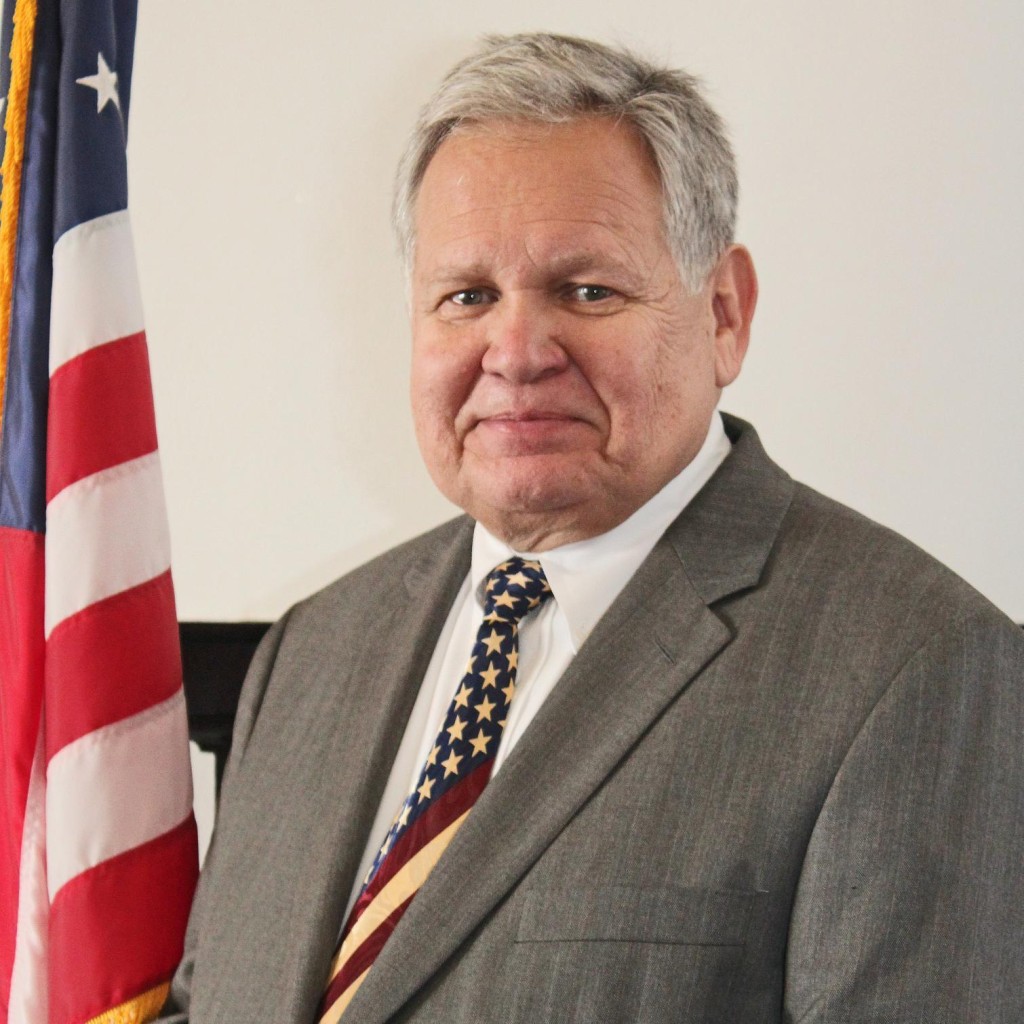
On Tuesday, a lawyer with the Alabama Ethics Commission ruled that State Auditor Jim Zeigler‘s active support for full funding of state pre-paid college program is permissible. The ruling was handed down amid some controversy over the fact Zeigler’s family had purchased two of the PACT – or Pre-Paid Affordable College Tuition – plans for the couple’s own children. Those concerns were jettisoned by commissioner Hugh Evans Tuesday, opening the path for Zeigler to continue his advocacy efforts. “Mr. Zeigler cannot separate his actions from his official role, but as long as he does not use his position or the mantle of his office to receive a benefit different than that accruing to the other members of the affected class, there is not an Ethics violation,” read the decision that cleared the statewide auditor. “The class affected is all participants in the PACT program. This is a very large class, and it would appear to affect all members equally.” Zeigler, who bought two PACT plans 16 and 21 years ago repsectively, has been pushing for the Legislature and governor to approve “a modest part” of funding from the recent settlement related to the 2011 BP Deepwater Horizon oil spill to make whole parents and guardians who had purchased plans before the program went insolvent in 2009, which led to a devaluation of the plans. Zeigler has argued plan purchasers would not improperly benefit from such an arrangement because they would simply be remedially receiving funding they were owed anyway, as opposed to benefitting from a new windfall. The plans, Zeigler told ALToday.com last month, were not an investment subject to loss but rather a contract the state agreed to fulfill at “a sum certain.” “This is a wrong that needs to be righted,” said Zeigler. “The BP money may be the last chance to provide the full tuition that these families paid for and based their planning on.”


